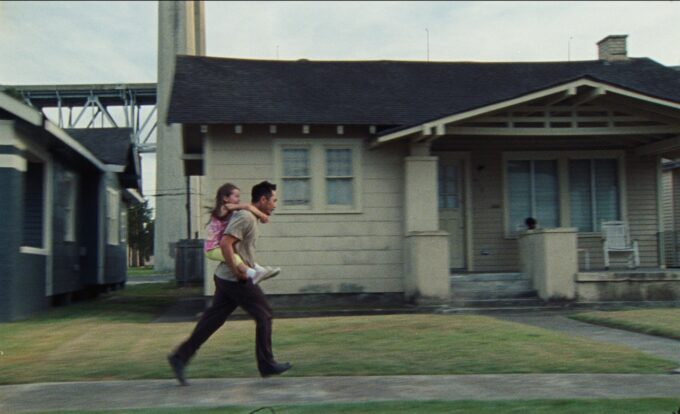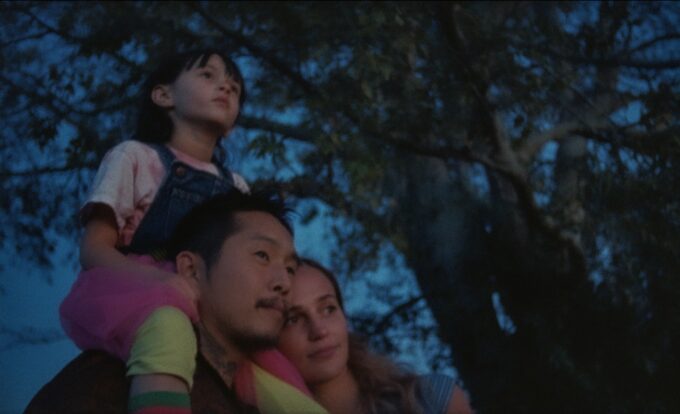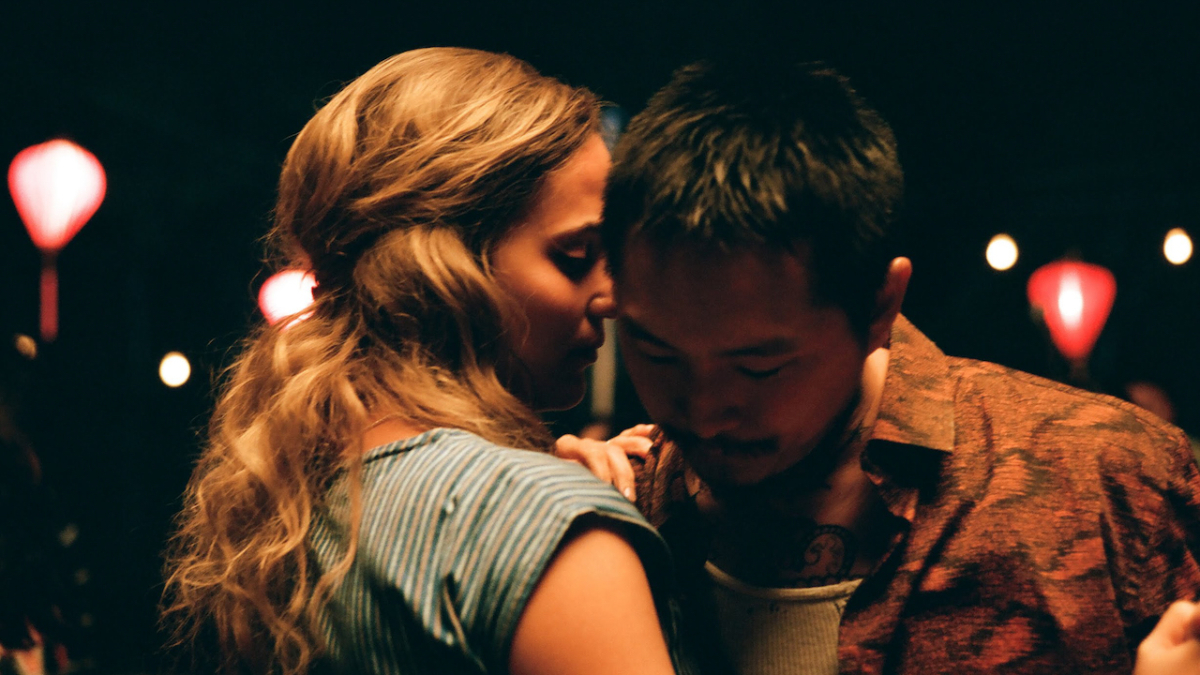Written By: Kano Umezaki
This article may contain spoilers.
In addition to cultural estrangement, the Korean migrant experience can also be characterized by its forgettings. With a severed homeland leading to forced transnational migration, feelings of alienation are common, if not imminent, to those of the Korean diaspora; many of whom did not choose to go elsewhere, but were rather, as Stuart Hall calls, “diasporized” by empire.
Justin Chon’s latest feature film, “Blue Bayou,” gives us a glimpse into the life of one Korean adoptee, whose story stands as just one of the many others who were displaced after the Korean War. Similar to his past directorial indie-films, “Gook” (2017) and “Ms. Purple” (2019), Chon’s crafted narrative focuses on the inherited traumas and histories of the Korean diaspora; except this time, he reveals a struggle Koreans share with many other racialized people: surviving the carceral reach of the American immigration system. “I‘m not focusing on just Korean Americans, but rather anyone who was adopted into this country by U.S. citizens who weren’t automatically granted citizenship,” shares Chon.
Shot in New Orleans, “Blue Bayou” serves as a window into a community often omitted from the big screen. “I’ve never seen Asian Americans represented from the South in a significant way. The tapestry of our community is larger than the cities on the coasts,” shares Chon. “I think New Orleans is such a resilient, unique place like no other in the U.S. It almost feels like its own country.”
The film documents the struggles of 30-something-year-old tattoo artist, Antonio (Justin Chon), who came to a small town in Louisiana when he was only three years old. With little memory of his homeland, he was adopted into a white American family via a patronizing adoption program, only to be abused and neglected by the very people who claimed to be his refuge. “I had felt the need to create this film while I was shooting “Gook,” so it was 5-6 years in the making. It took as long as it needed to, but it couldn’t be soon enough in exposing this urgent issue in the adoptee community,” shares Chon.
Adopting Korean children was common during the Korean War, a time when U.S. imperialism had severed the country in half, separating families across waters and borders. Since Antonio’s adopted parents didn’t fill out his required citizenship paperwork, he became undocumented, leaving him in the patchy remembrance of his past as a young adoptee from Korea.
Throughout the film, Antonio is forced to tread through this legal limbo, where despite his accent and memories being acclimated to the American South, his papers mark him as perpetually alien.
“I started to hear through the adoptee community and also from articles/videos I researched that this was taking place. My heart bleeds for anyone who was brought here as a child, only to find out in their 40’s or 50’s that citizenship isn’t automatic,” Chon shares.
Although Antonio is a victim of U.S. imperialism and its criminalizing immigration system, Chon refrains from shaping him into an icon of pity. Instead, Antonio is characterized by his blundering faults as much as his stirring virtues. While we see him remain secretive about his acts of robbery to his wife, we know he only wishes to make ends meet for his family.
There is a cruel disposition worth acknowledging here, where Antonio is realized as someone who is doubly criminalized: first through his undocumented status, and second through his material impoverishment which drove him to steal. “I hope the audience walks away with empathy for a human being trying to build a life for himself/herself. The main character, Antonio LeBlanc, isn’t perfect, so I’d like for the audience to ask themselves if people deserve second chances and redemption,” Chon says.

As Chon’s film sheds humanity on those who are displaced and undocumented, it also raises a critical question: Who exactly is deserving of deportation then? In attempting to answer, we’re required to unveil our layers upon layers of inherited judgement. We’re forced to unsettle the belief that there are criminals deserving of deportation versus the innocent who are worth saving, and that laws hold the moral power to define and distinguish between the two. “[The film] is absolutely a call to action to change the immigration system. If a child is brought here as an infant by U.S. citizens, they should automatically be granted citizenship,” Chon says.
The central conflict of the film is thus not about the diasporic Korean identity crisis of being forced to choose which borders one belongs to; rather, it’s about living with inherited struggles and traumas, and in spite of it all, choosing to live with an undefeated purpose. Because Chon’s film, although met with traces of loss, also shows the more abundant parts of Antonio’s life: him laughing against the sunset with his family, carefully tracing his friend’s last tattoo, holding his newborn daughter for the first time. These are the intimacies Chon strings together to paint Antonio’s life as not one merely haunted by loss, but also founded by care.
To help visualize these intimacies, Chon chose to shoot in 16mm film, which gave a retro, grainy texture to the images. “I wanted the film to feel timeless. I also wanted to give it a visceral, real, and intimate feel that filmmakers like Cassavetes were famous for. I wanted a tangible feeling of sorts for the film.” The color grading also heavily leans on blue hues, which gives off a nostalgic semblance, as if the past has settled over Antonio’s daily life. The blue is also a literal materializing of the water sourced throughout the film, which is characterized as forces of both destruction and rebirth.

While we’re invited to see Antonio’s present struggles of facing deportation, his past remains largely obscure. Most of what we know comes from his traumatic experiences with motherhood: his biological Korean mother tried to drown him, while his adopted mother perpetually neglected him in times of physical abuse.
In characterizing Antonio’s relationship with mothers as a recurring absence, Chon manages to place a profound strain on his m(other)lands, rendering the places of his roots into reminders of his own estrangement. But these emotional strands of alienation loosen when Antonio meets Parker (Linh Dan Pham), a Vietnamese refugee with terminal cancer.
Chon was very intentional with showing the interconnected histories Koreans have with Vietnamese refugees, particularly their shared struggles with Western and Japanese imperialist wars, as well as many of their diasporized, refugee status. “It’s important to show how we coexist and share similar experiences, and how we can learn from one another. It’s a collective existence not mutually exclusive, so our stories should represent that,” says Chon. “Also, one of my purposes is to bring empathy to Asian Americans, which includes all of us.”
In showing the fraught, but never hidden, connection between the Korean and Vietnamese diaspora, Chon depicts Asian refugees as sites of intercommunity care and resilience. Because Asian refugees are more than just their narrated moments of survival: they are also filled with stories of humor and dreams, of conviction and hope, of a past still remembered and spoken to.
While Chon is aware of the landscape of Asian American cinema and the types of stories that remain untold, his awareness points to a habit that people across the Asian diaspora carry. For many of us, we put the onus on films to refute historical legacies that have depicted Asians as unintelligible backdrops, calculating villains and modern geeks, amongst other racial trappings brought by visibility. I’ve sometimes wondered if my desire for diasporic Asian cinema to veer more into the political prefigured a compromising request: as if y(our) stories could only be told a certain way. But I’m now growing out of this thought because wanting the diverse, yet deeply interconnected, experiences of the Asian diaspora to be told, without all the shortcomings of romanticization, isn’t at all a fruitless wish; it’s an affirming one.
For many Korean Americans, and the general undocumented diaspora, Chon’s “Blue Bayou” serves as a befriending source of comfort. Because sometimes, what people want from movies is for someone to vouch for their suffering, and if they’re lucky enough, attempt to save them from it all together. And perhaps, for some people of the Korean diaspora, they seek Asian American films hoping that, somewhere amongst the flood of stories that make up y(our) diaspora, there lies one that somehow manages to hear them.
“Blue Bayou” makes its New York City premiere at the 44th Asian American International Film Festival on August 22nd. Ticket and screening information can be found here.

